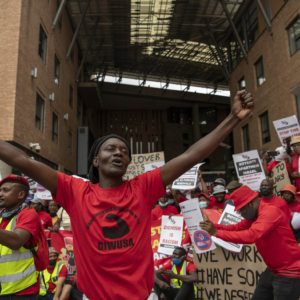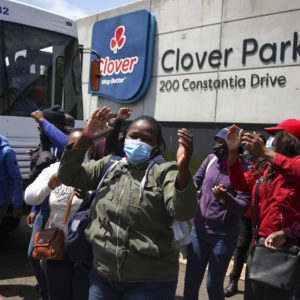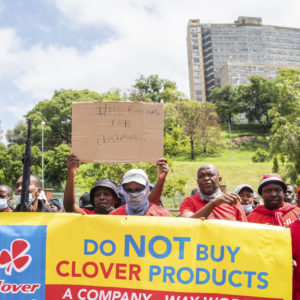First jobs, now bodies on the line for Clover workers
The strike at the dairy giant is becoming more volatile, with workers assaulted while picketing outside the company’s factory in Johannesburg.
Author:
11 February 2022

Long-time Clover employee Mishack Tau, 52, can barely walk after he was assaulted at the dairy company’s factory in Clayville while picketing with colleagues on 7 February.
Tau, who has worked at Clover for 11 years, is among the workers who have been on strike since 22 November last year. Workers are against the company’s proposed restructuring, which aims to cut R300 million in labour costs. This would mean retrenchments, salaries cut by 20% and working longer hours, including introducing a six-day working week and making it mandatory to work on public holidays.
Clover, which is 60% owned by the Israeli Central Bottling Company through Milco SA, has been antagonistic in its response to the strike. In one instance, it sent out an email saying that striking workers would not get their 13th cheques, which is in breach of labour law. Striking workers have also faced intimidation and been assaulted, with little repercussion for the perpetrators.
Tau puts on a brave face as he explains what happened. He is looking for an affordable replacement for his phone as he speaks, which he says was stolen during the assault in which he and two other workers were seriously injured.
Related article:
They were picketing at Gate 1, “then as we were thinking of leaving because it was late, an Avanza came from inside the factory and stopped near us. When they got out of the car we began running because we saw they had weapons like pangas and we realised they came to fight.”
The men scattered as two taxis with a number of men inside joined the Avanza, says Tau. Some of the picketers took cover in the sewerage drains and Tau was helping others get away. The men chased him, put him into one of the taxis and drove into the factory. “They beat me in the taxi and continued inside the factory. There was another man they were assaulting in the factory as well. Then they put us in the Avanza and drove to Gate 2.”
The men argued with security personnel at Gate 2, who eventually phoned a higher-up for permission to open the gate and let them leave. But the police and an ambulance arrived and intercepted them.
Global solidarity
On 7 February, the General Industries Workers Union of South Africa (Giwusa) and the Food and Allied Workers Union (Fawu) condemned the violence and claimed that Clover launched the attack.
“The taxis have been transporting scab [replacement] labour to the Clayville Clover factory and are parking their taxis, without number plates, on the factory premises. Of late, the scab labour has been sleeping at the factory and no longer requires transport. It appears that Clover is now hiring the taxi drivers as thugs and hitmen to intimidate and attack Clover strikers.”
Giwusa and Fawu have previously accused Clover of using unethical tactics to coerce striking workers into ending their protest. The pressure on the dairy company has increased as workers have gained support, with picketers protesting in solidarity outside Israeli consulates in countries such as Germany, the United States, Nigeria, Brazil and Sweden.
Related article:
Tau says his job feeds his family of four. “Because jobs are hard to find, everything is on my shoulders. My family has no one else to turn to. I just want us to have a life where we have our own house and car. Like other families, we want to live well.”
Though his injuries are severe – he has stitches in his swollen head, a sore back and foggy eyesight – Tau is resolute about the strike. “We all need a salary increase instead of salary cuts and retrenchment. Food prices, transport and everything has gone up, so it only makes sense that our salaries cover those basic expenses.”
Corporate response
Clover legal and secretarial group manager Steven Velthuysen said: “This entire situation resulted due to striking workers pelting stones at not only taxis, but also at Clover trucks and other third parties.” Taxi drivers who were in the area got involved and the South African Police Service (SAPS) dispatched officers, he said. “We are reliably informed that two taxi drivers were arrested. The matter remains in the hands of the SAPS. We have also approached the SAPS and have laid criminal charges against striking employees.”
Union leaders said their workers responded with violence only after they were attacked. Velthuysen said “the guards you refer to” do not work for Clover and as such, it is understandable that the company does not want to speculate about how it handled the situation. Clover “would leave this for the SAPS to investigate”.
Related article:
Velthuysen said it was alarming “that there were many striking workers and union members at the scene, but not one of them offered the employees any assistance. Perhaps you’d be good enough to ask the union and their leadership why. Although the unions have publicly denounced all violence and intimidation, it seems that their members are adamant to continue with unlawful conduct, which is against the interdict ruling handed down by the labour court.”
“It would seem that the unions have lost control of their members,” he added.
Naledi Sikhakhane is the 2022 Eugene Saldanha Fellow in social justice journalism.
Correction, 24 May 2022: The Eugene Saldanha Memorial fellowship is supported by the SET. It was incorrectly referred to as a fund.



